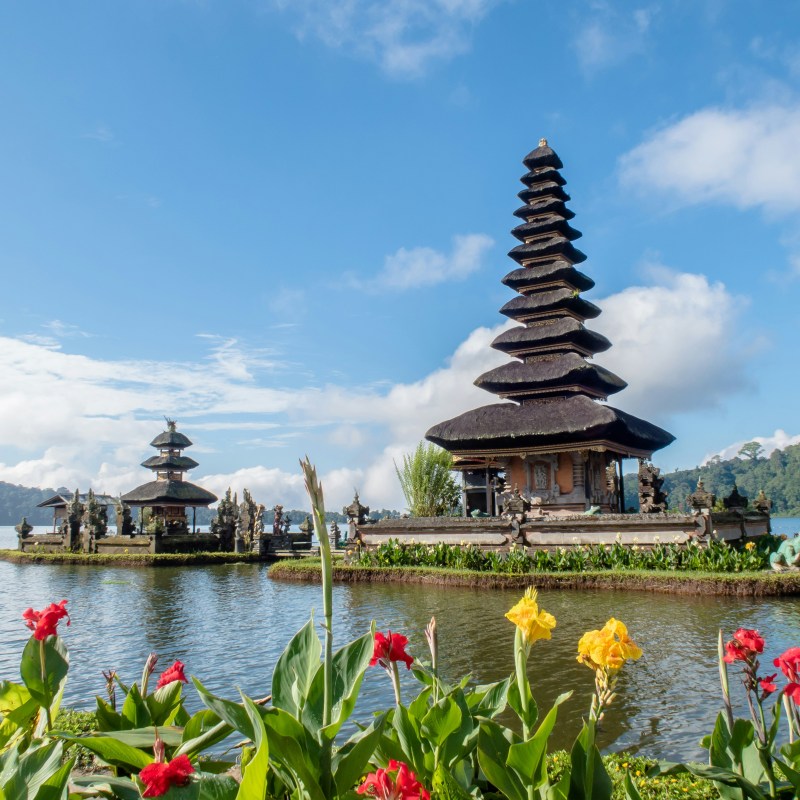
Thailand and Bali are two of the most popular Southeast Asian destinations for Americans.
Videos by TravelAwaits
From the outside looking in, they probably seem very similar.
They’ve got tropical jungles and stunning, world-class beaches. They’re also home to cultures that are distinct from the Western world, inciting a sense of wonder and intrigue.
And given their geographic proximity, it’s no surprise that it’s a tough choice between the two.
A trip to either Thailand or Bali won’t be forgotten any time soon.
That being said, I’ve spent time in both of these countries—and I can tell you that they’re incredibly distinct.
I spent time in Bali studying tourism and sustainability. In Thailand, I took on more interesting studies, including the spirituality of Sak Yant tattooing, foreign investment in the tourism industry, and Burmese refugees. (I also enjoyed sunny holidays in both places, but that’s slightly less intriguing.)
If you’re heading to Southeast Asia and want more information on what makes these destinations different from a tourist’s perspective, then let me give you an outline. (I’m desperate to use this Global Studies degree.)
Thailand has (way) more than tropical beaches
Let’s get this out of the way first. Thailand is a country that spans almost 200,000 square miles and it’s a force to be reckoned with.
Its kingdom was never overtaken by a colonial power—not the British, not the French, and not the Dutch. And not from a lack of trying, either.
(Uniquely, Bali is also a kingdom. I had the great pleasure of dining with one of its princes when I stayed on the island back in 2013. The last active royal of Bali, Tjokorda Istri Muter, passed away in the early 2000s—but her descendants still uphold and exemplify her cultural legacy.)
Bali, by contrast, is a small island that spans just over 2,000 square miles. It’s but one of Indonesia’s 17,000 islands.
Though you can find pristine beaches and tropical jungles in Bali, its scale is nothing compared to Thailand.
Thailand is home to Chiang Mai, a jungle outpost near the border with Myanmar. It’s home to one of the world’s wildest cities in Bangkok. And it’s home to dozens of iconic landmarks, from the Grand Palace to Wat Arun to floating markets like Damnoen Saduak.
Religion: Hinduism vs Buddhism
As a student of spiritually-adjacent topics, I’d also like to point out that Thailand and Bali practice different religions.
Bali is a largely Hindu island that traces its religious origins back to the Hindu conquests of the Middle Ages.
Thailand, by contrast, is a distinctly Buddhist state. While there’s plenty of animism still present (that’s nature-based beliefs), there’s also a strong emphasis on Buddhist values. You’ll find temples dotting the country, which are open to anyone. Just make sure to dress appropriately.
Bali is much more mellow
Bali has taken off as a tropical destination—but it’s got an association with wellness retreats and yoga programs.
You can find nature-based and New Age-centric retreats across the island. The goal is for visitors to get in touch with themselves to attain a new and more well-rounded lifestyle.
Thailand is notorious for the opposite.
I had the grave misfortune of attending a Full Moon party in Koh Phangan back in 2012. Yes, you can buy drinks by the bucket at these types of beach parties. Yes, you can act like a feral idiot and no one will step in. Yes, you can pay for company of just about any type.
These types of tourists aren’t the only ones in Thailand—but they’re certainly the loudest. For this reason, I’d advise travelers to stick to Bali. Rowdy and rude tourists in Thailand have been chipping away at local traditions and tolerance for decades.
They’re also going to interrupt your relaxing vacation if you head to hotspots like Koh Phi Phi or Koh Phangan. Guaranteed.
Thailand has more visible traditions
I’m transparently suspicious of disrespectful tourists in Thailand—and Bali, but its impact hasn’t yet been felt in full force.
That being said, I’d hate to paint an unfair picture of Thailand as a hellscape of debauchery. It’s far from that.
Let’s take a look at what the country should be known for, in my opinion.
Aside from withstanding the grip of European colonialism, it’s also renowned for its many cultural traditions.
There’s sak yant tattooing, Muay Thai fighting, local lantern and water festivals, films like Ong-Bak and Pee Mak, and the world’s most famous energy drink: Red Bull.
The former was originally known as Krating Daeng when it was formulated and marketed back in 1975. Today, Thai owners still maintain influence over the company—and it’s extended projects, including the Formula One Red Bull Team. (F1 fans probably know about Alexander Albon, too.)
My point: Thailand is a lot more than a tropical destination for tourists craving bucket-sized cocktails.
And when you visit, you might be surprised to realize that you know more about the country and its traditions than you thought.
